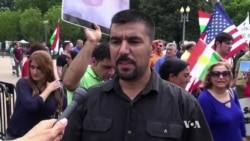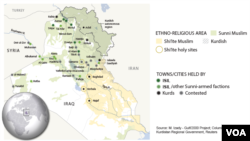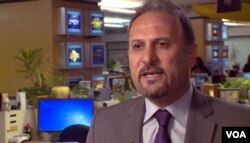Over the last week, the plight of Iraq's Yazidi religious minority has captured the world's attention. Thousands of Yazidis fleeing violent Sunni militants called Islamic State have been stranded on a mountain in northeastern Iraq without food or water or shelter. The militants have overrun their homes, demanding that the Yazidi, Christians and others convert to Islam or die.
American Yazidis, seeking U.S. help for imperiled relatives and friends, have been expressing their concerns in demonstrations and in meetings with Obama administration officials.
Khalid Haider and dozens of other Kurds demonstrated outside the White House recently, waving signs calling for help to "Free Kurdistan" or "Prevent Genocide Against Kurds, Yezidis, Christians."
Haider's brother, with his wife and children, was among those stranded on Mount Sinjar for a week. He spoke by phone with a niece, Haider said. "She was saying, 'I want you to come and help me. I want you to take me and hold me,’ because that is what I used to do and play with her. She’s trapped with the rest of the kids."
The demonstrators chanted thanks to the U.S. for airstrikes against the militants, which began last weekend, and for air-drops of food, water and blankets to the refugees on Mount Sinjar.
But they also chanted, "USA do more … Save minorities."
The U.S. and Iraqi airstrikes against the militants have opened a few narrow escape routes. Some 31,000 Iraqis – most from Mount Sinjar – already have walked or driven to safety in Iraq’s Kurdistan region via Syria, according to the United Nations’ Office for the Coordination of Humanitarian Affairs.
American Yazidis consulted
Dakhil Shammo Elias, a Washington-based journalist with VOA’s Kurdish service, has been part of several small contingents of American Yazidis invited to meet in recent days with representatives of the White House, the State Department and the U.S. Agency for International Development.
The American Yazidis came not only from the Washington area but from communities in Arizona, Nebraska and Texas, said Elias, a founder of the Kurdish Community Center D.C.
In the various meetings, "we asked for military action – air cover to attack [militants’] bases – and to deliver humanitarian assistance," said Elias, who comes from the Iraqi town of Shehain, about 40 kilometers north of Mosul, near where militants have taken control of a critical dam.
Elias, 52, has been in the United States since 1998, after Iraq’s civil war forced him out of the country and into a U.N. refugee camp in Syria for four years. He has no immediate family left in the semi-autonomous Kurdish region of northeastern Iraq, but "we’re all brothers," he said of the Yazidis.
Elias said Tuesday that his hometown had been evacuated, "but now after several days of U.S. airstrikes, people are returning – those who have no kids."
Yazidis with children or other especially vulnerable people are keeping their distance, the journalist said. He and others in the American Yazidi delegations told administration officials that "we were getting reports that thousands of young girls and women are getting captured" by Islamic extremists and taken to a jail south of Mosul.
Elias said he and others have heard from multiple sources that "there was a market established to sell them in Tel Afar," a town controlled by the Islamic State extremists.
Longer-term requests
Airstrikes and humanitarian aid constituted the American Yazidis’ urgent requests, Elias said. In the longer term, he said the various delegations asked the administration "to find a formula, a mechanism, so people can be protected by the United Nations, Americans or another power."
Elias was part of a group that met Friday evening at the White House with Ben Rhodes, deputy national security adviser. Rhodes assured the American Yazidis that President Barack Obama was committed to helping them.
"What we understood is that he will not stop until our community is safe and protected," Elias said. "We requested faster action."
Elias said Sarah Sewall, undersecretary of state for human rights, told his American Yazidi delegation that the State Department would work with Turkey and other countries in the region to establish Iraqi refugee camps and provide material assistance.
He said he and other American Yazidi are in close contact with relatives and friends in Iraq, even those still on the mountainside. Some have been able to charge their cellphones in their cars; others have gotten fresh batteries air-dropped as part of British humanitarian aid.
Among "all the people I talked to, no one wants to come back even if it’s 'safe,'" said Elias. Sources told him the Kurdish regional government’s peshmerga militia, praised as skilled and resolute fighters, simply left when Islamic State militants reached areas where Yazidis live.
Yazidis, Elias said, “don’t trust anyone anymore.”
US supplies light weapons
The administration acknowledged Monday that it has started providing light weapons to the peshmerga.
But the administration is hesitant about giving them heavier arms, said Justin Logan, director of foreign studies at the Cato Institute, a libertarian think tank in Washington.
It worries "about arming non-state groups inside of Iraq and the influence that could have on the viability of the central government that has already taken a beating in recent weeks," Logan said, citing what he said was "long-standing" U.S. support for a united, centralized Iraq.
Many Kurds have demanded independence from Iraq; they’ve built a semi-autonomous region in the northeast, with Irbil as its seat of government.
Haider, one of the demonstrators at the White House, thinks Iraq has already fallen apart.
"Kurds are on one side, ISIS in the middle, Shia from the South," he said. "And now who’s paying the price for it? Minorities like mine. People like the Christians."
Obama, Secretary of State John Kerry, Pentagon spokespeople – all have repeatedly said the administration is constantly assessing the situation and adjusting its response.
Logan noted they’re all adamant about one thing: not putting American troops back on the ground in Iraq.
That’s viewed as "a slippery slope," Logan said. "The idea [is] that once you get troops on the ground, there’s a greater probability that some of them could be injured or killed in the fighting and that that could lead to further entanglement, whereas the United States has pretty significant insulation from risks from the air."












